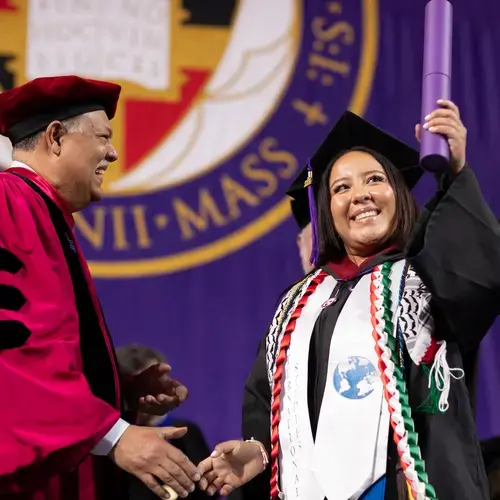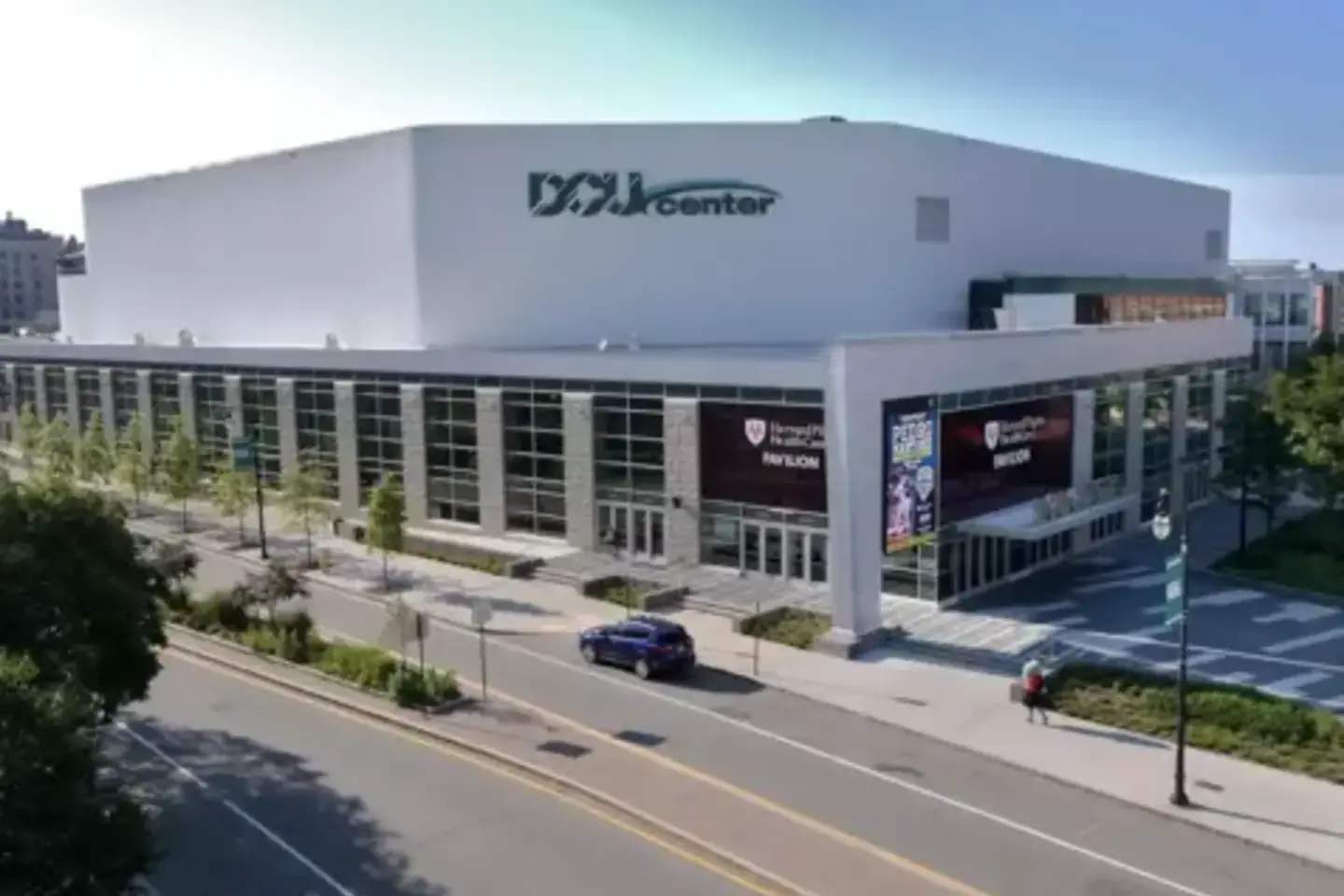
Commencement


Graduation isn’t a finish line — it’s only the beginning.
The College of the Holy Cross will celebrate its 179th Commencement Exercises for the Class of 2025 on Friday, May 23, 2025.
Schedule of Events
As the Class of 2025 prepares to embark on the next chapter of their lives, the College is excited to celebrate the accomplishments of the class alongside their family, friends, mentors, faculty and staff. Families will be invited to join us in Worcester for events beginning Wednesday, May 21. Explore the listing of confirmed events below.
Wednesday, May 21, 2025
Mosaic Celebration
This event honors and celebrates the achievements of students from a wide range of identities in the Class of 2025 who have made a meaningful impact on the College community. Hosted by the Division of Justice, Equity, Belonging, and Identity (JEBI).

ASL Interpreter Provided
Thursday, May 22, 2025

Senior Portraits
10 a.m.–1 p.m.
Fenwick Hall Porch
Photographer Robert Carlin will be on campus to capture professional photos of you and your classmates in your academic regalia on the historic Commencement Porch, located at the front of Fenwick Hall. Photos will be available for free download. Please note, these are not the same as the yearbook photos.

Phi Beta Kappa Induction Ceremony
10 a.m.–11 a.m.
Smith Hall, Rehm Library
Phi Beta Kappa National Honor Society will hold the 2025 induction ceremony to welcome new members to Pi of Massachusetts, the Holy Cross Chapter. A number of students will be inducted into this prestigious honor society. Family, friends, faculty and students are welcome.

ASL Interpreter Provided

NROTC Commissioning
11 a.m.–12 p.m.
Kimball Hall, Seelos Theater
This traditional ceremony awards commissions in the United States Navy and Marine Corps to students graduating through the NROTC program at the College of the Holy Cross. The NROTC program includes cross-town enrollment students from Worcester Polytechnic Institute, Worcester State University and Brown University.

ASL Interpreter Provided

Awards Ceremony
12:30 p.m.
Dinand Library, Main Reading Room
Senior Academic Awards and Prizes will be presented by Sarah Petty, Dean for the Class of 2025, and the Presidential Service Awards will be presented by President Vincent D. Rougeau, assisted by Michele C. Murray, Senior Vice President for Student Development and Mission. This event will be available via livestream.

ASL Interpreter Provided

Baccalaureate Mass
3 p.m.
Fitton Football Stadium
This annual liturgy of celebration, blessing and thanksgiving is open to all seniors, their families and guests. All faith traditions and beliefs are most welcome and there is no limit to the number of guests who may attend. Members of our Jesuit community will preside and preach, while students, faculty and staff of the College will serve as our ministers and musicians. This event will be available via livestream.
Fitton Football Stadium is an outdoor venue. As guests are planning, please note that the weather at the end of May is often quite warm, and that getting onto the field requires navigating grass and uneven ground. For elderly guests and those with limited mobility, accessibility information can be found on the accessibility page, including transportation and access to the football stadium. In the event of inclement weather, Baccalaureate Mass will be moved indoors.

ASL Interpreter Provided

Last Sunset on the Hill
7:30 p.m.–9:30 p.m.
Hogan Campus Center, Hoval
Members of the Class of 2025 and their families are invited to gather and enjoy one final sunset on The Hill. The event will include live music, light food and refreshments. There is no cost to attend this event.
Friday, May 23, 2025

179th Commencement Exercises
10:15 a.m.
DCU Center
The College will celebrate the 179th Commencement Exercises for the Class of 2025 with graduates and guests. Please join Vincent D. Rougeau, president of the College, in honoring the achievements of our graduates. There is no limit to the number of guests who may attend Commencement. However, this year, all guests will be required to have a ticket for entry into the DCU Center. See additional details in the “ticketing” section below.
Doors will open at 8 a.m. and seating is on a first come, first served basis. The procession of graduates will begin promptly at 10:15 a.m. The ceremony is expected to be approximately two-and-a-half hours. This event will also be available via livestream.

ASL Interpreter Provided
Commencement Reception
Immediately following the ceremony at the DCU Center Convention Hall, graduates and their guests will have the opportunity to celebrate with faculty and staff. A light fare menu will be served.

Commencement at the DCU Center
Tickets
There is no limit to the number of guests who may attend Commencement. However, this year, all guests will be required to have a ticket for entry into the DCU Center. Tickets are free and will be delivered digitally. Graduates will receive a link to claim their tickets via the Tassel system and then be able to electronically distribute them to their guests. Graduates will be emailed additional details and instructions from commence@holycross.edu. Graduates should claim tickets by Friday, May 16.
Tickets only allow entry into the DCU Center. Once inside, there are no assigned seats for the ceremony. All seats are on a first-come, first-served basis.
Please note: due to the ticketing software, ticket registration is limited to 10 guests at a time. If graduates plan to have more than 10 guests in attendance, they can submit this information when they register for Commencement in the Tassel system.

Entering the DCU Center
All guests must enter the DCU Center through the main entrance at the intersection of Major Taylor Blvd and Foster Street.
Prohibited Items
Please note, that per DCU Center policies, guests may not bring outside food or beverages into the building. The DCU Center does have a No Bag Policy. Small purses/wristlets of a MAXIMUM SIZE of 8x10 inches will be permitted. Medical bags and diaper bags will be allowed and must be checked prior to entry. Other items, including helium balloons, are also prohibited at the ceremony. Please see the DCU Center website for a complete listing of prohibited items.
Information for Graduates
Students can now complete their online order form for caps, gowns and hoods. Seniors should see their email for the online form. Double majors should select one major to be represented by their hood color. Orders must be completed by Sunday, March 23. These items are delivered to campus and will be distributed May 5-7. December graduates will be able to pick them up the week of May 19. Department or program specific academic stoles and/or cords are coordinated by individual departments. Those providing these will be in touch directly with graduates.
Graduates are able to keep their caps, gown, hoods, tassels, and zipper pulls. For those who do not want to keep their gowns, collection bins will be available in the reception area of the DCU Convention Center and on Hogan 1 following Commencement. Gowns that are returned will be recycled into other products.
The College is proud to share that in the effort to remain green on campus, all Holy Cross graduates will be wearing environmentally conscious GreenWeaver® regalia, made here in the USA. This line of graduation wear is made of fabric spun from molten plastic pellets produced from 100% post-consumer recycled plastic bottles. For every gown ordered, Oak Hall will contribute $0.25 to the College’s sustainability efforts. Learn more about GreenWeaver® regalia.
Graduates will receive a link to claim their tickets via the Tassel system and then be able to electronically distribute them to their guests. Graduates will be emailed additional details and instructions from commence@holycross.edu. Graduates should claim tickets by Friday, May 16. Please note: due to the ticketing software, ticket registration is limited to 10 guests at a time. If graduates plan to have more than 10 guests in attendance, they can submit this information when they register for Commencement in the Tassel system.
Each graduating senior has the option of ordering a set of 10 physical Commencement announcements. These are formal announcement cards meant to be sent to family and friends to whom you wish to send news of your upcoming graduation. These are not invitations, but announcements of your achievement. There is no cost to receive these. Please note, seniors must opt-in to receive the physical announcement cards. Graduates will receive an email with a form to claim these by March 4. Announcements will be distributed at the end of March. Electronic versions of the announcements are available in jpg or pdf form.
Seniors should arrive at the area between the football and baseball stadiums by 2:15 p.m. for line-up. Seniors will process into the stadium at 2:45 p.m. Commencement gowns (but not hoods or caps) should be worn.
Graduates will be transported from Hogan 3 to the DCU Center for Commencement. Additional details will be provided closer to Commencement.
Graduates are expected to arrive at these locations by 8:30 a.m. to be transported. Those traveling on their own must arrive at the DCU Center no later than 9:00 a.m. Upon arrival, enter through the revolving doors of the Convention Center located on Major Taylor Boulevard. Graduates should be wearing their gown and hood and have their cap with a tassel and Holy Cross zipper pull.
All graduates, faculty, staff, and guests should be prepared for metal detector screening. Graduates do NOT need tickets to enter the DCU Center.
Graduating seniors will need to completely move out of the residence halls by 8:00 p.m. on Friday, May 23, 2025. Residence Life and Housing recommends that students begin to pack up their spaces before graduation to make the move-out process smoother. More information will be shared with graduates in early February.
Students from further distances who have questions or concerns related to the move-out timeline should reach out to Residence Life and Housing via email at reslife@holycross.edu.
Prints and framed copies of the Class of 2025 photo taken on move-in day can be purchased at panfoto.com.
The College works with Herff Jones for the ordering of class rings. Class rings can be ordered online. Periodically, Herff Jones is on campus outside of the College Store in the Hogan Campus Center. For more information please contact hcstore@holycross.edu.
Senior Week programming sponsored by the Student Government Association Senior Class Council will begin on Sunday, May 18, 2025. More information regarding other student celebrations will be sent to seniors from your Student Government Association Senior Class Council when it is available. Please contact the Office of Student Involvement at osi@holycross.edu with questions.
Lauren Studios has contacted the class with information on how to schedule their Senior Portraits for the yearbook. The Class of 2025 yearbook is available for purchase online. Feb. 28 is the last day personalization will be offered. Seniors are encouraged to send images from their years on The Hill to patcher@g.holycross.edu or Jostens for inclusion in the book.
Parents of the Class of 2025 can purchase a parent ad in the yearbook and share a special message using this online form. Learn more about parent ads.
The Purple Patcher Yearbook Club works in collaboration with the Office of Student Involvement to coordinate senior photos for the yearbook and yearbook sales. Please contact patcher@g.holycross.edu or their advisor, Jennifer Feraud '21 at Jferaud@holycross.edu with questions.
Information for Guests with Accessibility Needs
ASL interpreters will be present on the stage throughout the Mosaic Celebration, Phi Beta Kappa Induction Ceremony, NROTC Commissioning, Awards Ceremony, Baccalaureate Mass, and Commencement. At Baccalaureate Mass, seats are reserved on the stage left (audience right) side for viewing the interpreter and a large screen with a picture-in-picture display will be available. For the Commencement Ceremony at DCU, there will be large video display boards on both sides of the stage, as well as the overhead jumbotron, with a picture-in-picture display.
If you or a member of your party anticipate using these services, please complete the accessibility request form so we can best assist you.
Assistive listening devices for use during the Awards, Baccalaureate Mass, and Commencement can be requested using the accessibility request form. These are available on a first-come, first-serve basis.
Live captioning will be available on the livestream of the Awards, Baccalaureate Mass, and Commencement Ceremony. These links will be made available in May.
At Baccalaureate Mass and Commencement, live captions will be available on large video display boards with a picture-in-picture of the interpreter. These displays will show open captions in real time, provided by a human captioner. These same captions will be available for those watching the livestream on YouTube.
Deaf Services Unlimited also provides a stream of the captions (not video) to a website called StreamText for viewing on any mobile device if desired. StreamText is a browser based platform for viewing live, text only captions. Links to the StreamText captions will be made available closer to the event.
In addition to traditional print programs, programs will be made available via PDF files for viewing on electronic devices to enhance size or utilize reading devices. The electronic versions will be available as PDF downloads from the Commencement website.
Thursday, May 22 on campus:
- Guests may park in the following locations: Hogan Lots, Freshmen Field (weather permitting), and the parking garage.
- There will be shuttles available on campus to assist guests. Shuttle stops will be clearly marked throughout campus.
- For Baccalaureate Mass, guests who use wheelchairs may be dropped off at Gate Zero for Mass (if held outdoors). Two levels of the parking garage will be reserved for guests with handicap placards.
Friday, May 23 at the DCU Center:
- The DCU Center is handicapped accessible. Guests are advised to enter at the Major Taylor Blvd. and Foster Street entrance.
- Handicap permit parking in designated and metered spots is available adjacent to the DCU Center. The Mercantile Garage is the nearest garage to the DCU Center event entrance. More information can be found on the DCU Center website.
- DCU Center has fourteen viewing areas designated for accessible seating in Sections 102, 103, 104, 106, 108, 110, 112, 113, 117, 118, 120, 121, 123, and 125. These are available on a first-come, first-serve basis.
Additional Information
We advise guests to book hotels early. Here is a list of College partner hotels.
A limited number of on-campus rooms will be made available for family housing on Thursday, May 22. Rooms will be available on a first come, first served basis. Each room has two twin-size beds. Please note, rooms do have air conditioning and private bathrooms. Linens are provided. Cost is $50/room. Reservations must be made online by Friday, May 2.
During the Commencement ceremony, GradImages will be photographing graduates. Each graduate will have their photo taken with the president as they cross the stage, and also once they exit the stage. Proofs of these will be available after the ceremony. You will be able to purchase prints and/or digital copies of the images.
Please note: dinner will not be available on campus Thursday evening; however, there are a few reception options with light fare. Worcester has many wonderful restaurants. Visit Discover Central Mass for a listing of local options. Reservations are strongly encouraged.
Graduating seniors will need to completely move out of the residence halls by 8:00 p.m. on Friday, May 23, 2025. Residence Life and Housing recommends that students begin to pack up their spaces before graduation to make the move-out process smoother. More information will be shared with graduates in early February.
Students from further distances who have questions or concerns related to the move-out timeline should reach out to Residence Life and Housing via email at reslife@holycross.edu.
The College will create and distribute a press release to the hometown news outlets, high schools and local elected officials of every 2025 graduate. See the Merit Pages FAQ for more detailed information.
Class Photo
Prints and framed copies of the Class of 2025 photo taken on move-in day can be purchased at panfoto.com.
Class Rings
The College works with Herff Jones for the ordering of class rings. Class rings can be ordered online. Periodically, Herff Jones is on campus outside of the College Store in the Hogan Campus Center. For more information please contact hcstore@holycross.edu.
Yearbook And Senior Portraits
The Class of 2025 yearbook is available for purchase online. Feb. 28 is the last day personalization will be offered. Parents of the Class of 2025 can purchase a parent ad in the yearbook and share a special message using this online form. Learn more about parent ads.
The Purple Patcher Yearbook Club works in collaboration with the Office of Student Involvement to coordinate senior photos for the yearbook and yearbook sales. Please contact patcher@g.holycross.edu or their advisor, Jennifer Feraud '21 at Jferaud@holycross.edu with questions.
Frequently Asked Questions
There is no limit to the number of guests who may attend Commencement. However, this year, all guests (graduates do not need tickets) will be required to have a ticket for entry into the DCU Center. Tickets are free and will be delivered digitally. Graduates will receive a link to claim their tickets via the Tassel system and then be able to electronically distribute them to their guests. Graduates should claim tickets by Friday, May 16.
Please note: due to the ticketing software, ticket registration is limited to 10 guests at a time. If graduates plan to have more than 10 guests in attendance, they can submit this information when they register for Commencement in the Tassel system. All additional requests for tickets will be granted.
The College is introducing ticketing to aid in event preparation and better ensure those in attendance are invited guests of graduates.
Children 4 years of age and older need a ticket to enter the DCU Center for Commencement.
We cannot say for sure what time the ceremony will end; however, we anticipate it concluding around 12:45/1 p.m.
Guests on Thursday may park in the following locations: Hogan lots, Freshmen Field (weather permitting), and the parking garage. Shuttles will be available to assist with transportation on campus from lots to event locations.
The College is able to provide some transportation assistance for on-campus events via shuttles, but we are not able to supply wheelchairs. For those in need of wheelchairs for the day on Thursday or Friday we recommend you bring your own or rent one. Apple Homecare and Rehab in Sterling, MA can be contacted for rentals.
Graduates claim their tickets for their guests through the Tassel system. Once a graduate completes their Commencement registration form, their tickets appear on their Tassel homepage. Graduates then send their guest e-tickets to one or more people via email.
No. Tickets can be scanned electronically. If guests prefer, they can print their tickets.
Graduates can make changes to their tickets by logging into the Tassel system.
Yes, the College has hired a photographer to take photos throughout the ceremony. Ceremony pictures will be posted to the College website following Commencement. Additionally, photos will be taken of graduates with the president as they walk across the stage and after exiting the stage. These will be available for review and purchase from GradImages. Students will receive additional information about this.
No, this event is offered free to students and families.
Please contact the Purple Patcher Yearbook at patcher@g.holycross.edu or their advisor, Jennifer Feraud '21 at jferaud@holycross.edu with questions.
Senior Week programming, sponsored by the Student Government Association Senior Class Council, will begin on Sunday, May 18, 2025. More information regarding other student celebrations will be sent to seniors from your Student Government Association Senior Class Council when it is available. Please contact the Office of Student Involvement at osi@holycross.edu with questions.
The College works with Herff Jones for the ordering of class rings. Class rings can be ordered online. Periodically, Herff Jones is on campus outside of the College Store in the Hogan Campus Center. For more information, please contact the bookstor@holycross.edu.
Per DCU Center policies, guests may not bring in helium balloons, signs, umbrellas, bags, or outside food/beverages. Small purses/wristlets of a MAXIMUM SIZE of 8x10 inches will be permitted. Medical bags and diaper bags will be allowed and must be checked prior to entry. Please see the DCU Center website for a complete listing of prohibited items.
We are committed to the safety and security of all attendees at our Commencement ceremony. Using metal detectors is a proactive measure to prevent any potentially harmful items from entering the venue, which will enhance the overall safety for everyone present. This practice is consistent with other colleges in Worcester.
Have Additional Questions?
Email us at commence@holycross.edu or call 508-793-3475.